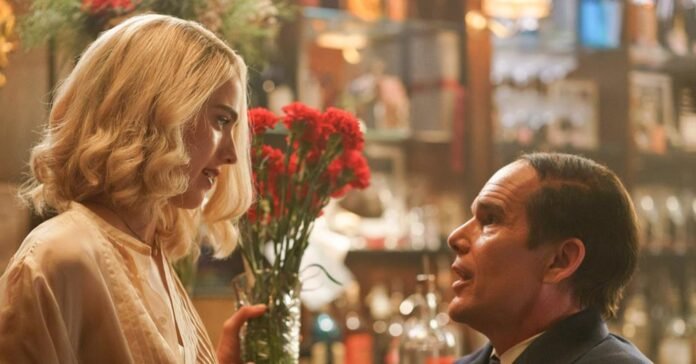Dir: Richard Linklater. USA/Eire. 2025. 100mins
Earlier than Rodgers and Hammerstein, there was Rodgers and Hart. It was composer Richard Rodgers’ inventive partnership with lyricist Lorenz Hart within the Nineteen Twenties and Thirties that arguably dragged Broadway musical theatre out of the shadow of operatic melodrama and into the trendy age, placing odd, relatable American speech into the mouths of singers for the primary time. However Hart was an more and more unreliable working associate who mainly drank himself to his untimely loss of life in November 1943, on the age of 48 – and it was Rodgers’ new writing sidekick, Oscar Hammerstein II, who would lead the composer, and himself, to worldwide fame.
Soaked in nostalgia for a misplaced theatrical world
Blue Moon, which performs out on the evening of the premiere of Rogers and Hammerstein’s first hit, Oklahoma!, is a romantic, humorous, shifting, life-affirming chamber piece that’s itself an important instance of a three-way inventive collaboration – between director Richard Linklater, author Robert Kaplow and actor Ethan Hawke. Premiering in Berlin Competitors, this Sony Photos Classics acquisition is certainly one of two Linklater tasks because of emerge this 12 months – the opposite being Nouvelle Obscure, his drama concerning the making of Godard’s Breathless. Hawke’s pleasant efficiency right here, which mixes each twinkle and tragedy, is complimented by help by Andrew Scott (as Rogers) and Margaret Qualley.
The story performs out virtually in actual time on that Might 1943 night. Unimpressed by the present, Lorenz Hart (Hawke) has drifted throughout the road earlier than the top to legendary Broadway restaurant and ingesting gap Sardi’s (reconstructed with loving constancy on an Irish soundstage) the place the primary evening get together will happen.
Right here he regales seasoned barman Eddie (Bobby Cannavale) – an everyday, no-nonsense man who has seen all of it – and a military serviceman on go away (John Moran), who’s attempting out some melodies new and outdated on the piano, with what’s mainly a monologue, punctuated by the briefest of interactions with Eddie and the soldier. Alongside the best way, Hart tears into what he sees because the phoney corn-belt patritotism of Oklahoma! – starting with that pointless exclamation mark – whereas making ready the room for the arrival of his newest crush, Elizabeth (Margaret Qualley), a glamorous Yale scholar greater than 20 years his junior.
Hart was homosexual, after all. However his obsession with the willowy, good younger Elizabeth s based mostly, an after-title informs us, on letters Hart exchanged with the true Elizabeth Weiland. Within the movie, the smitten Hart explains the paradox by telling her that he’s “drawn to magnificence, wherever I discover it”.
Anybody with half a watch for drama can see the potential in watching Hart’s inventive comet obtain a dying flare-up simply when Hammerstein’s new star is born. To do all of it in a single location, and to hinge all of it on a single efficiency, with no recourse to flashbacks, is the true problem. Kaplow’s nuanced script, ably interpreted by Hawke, is as nimble as certainly one of Hart’s personal lyrics in shading from self-aggrandizement to self-mockery and self-pity right away, whereas preserving all of the lyricist’s well-documented wit and brilliance.
However it’s when the present throughout the street lastly finishes and Rodgers (Andrew Scott) and Hammerstein (Simon Delaney) enter with their doting entourage that Blue Moon shakes off its air of an excellent off-Broadway play and turns into mesmerizingly cinematic. Scott’s Rodgers appears suave and distracted at first however, in a collection of snatched conversations along with his outdated theatrical sparring associate – one tellingly set midway up a staircase – 20 years of admiration and damage, skilled love and betrayal are laid naked.
Within the bland 1948 MGM Rodgers and Hart biopic Phrases And Music, wherein Mickey Rooney performed the wayward lyricist, Tom Drake’s Richard Rodgers turns to the digital camera to apologize for the dearth of drama within the story that may observe. “There have been not one of the trials and tribulations you’ll ordinarily count on,” he drawls. “The truth is we have been simply two fortunate fellows who had success very younger”. It has taken till now for the poignancy of this story to be dedicated to the display.
With its darkish wood bar, purple leather-based banquettes and framed caricatures of Broadway greats, Sardi’s turns into a type of protected, performative cocoon for Hart, a small, unassuming man with a combover whose confidence and stature derive from his method with phrases and the photographs of whisky he shouldn’t be ingesting. Intimacy with Elizabeth is achieved solely when each retire to the cloakroom – one other evocatively used in-between area – the place the person well-known for his means to place phrases to heartbreak succumbs to his personal.
An intimate character examine, Blue Moon is warmly shot, soaked in nostalgia for a misplaced theatrical world. It’s accompanied by a medley of melodies – ostensibly performed by the pianist soldier Hart names Knuckles – that serves as soundtrack, career-best antholology and, sometimes, ironic counterpoint. As a result of that is additionally a movie about an inventive perfectionist, illiberal of the type of straightforward, populist success he sees in Oklahoma!, He complains that ‘Blue moon, you left me standing alone, with no dream in my coronary heart, with no love of my very own’ is without doubt one of the corniest lyrics he ever wrote. But it’s the one by which he’s greatest remembered.
Manufacturing firms: Detour Filmproduction, Renovo Media Group
Worldwide distribution: Sony Photos Classics, sony_classics@spe.sony.com
Producers: Mike Blizzard, John Sloss, Richard Linklater
Screenplay: Robert Kaplow
Cinematography: Shane F. Kelly
Manufacturing design: Susie Cullen
Modifying: Sandra Adair
Music: Graham Reynolds
Most important solid: Ethan Hawke, Margaret Qualley, Bobby Cannavale, Andrew Scott, Simon Delaney








